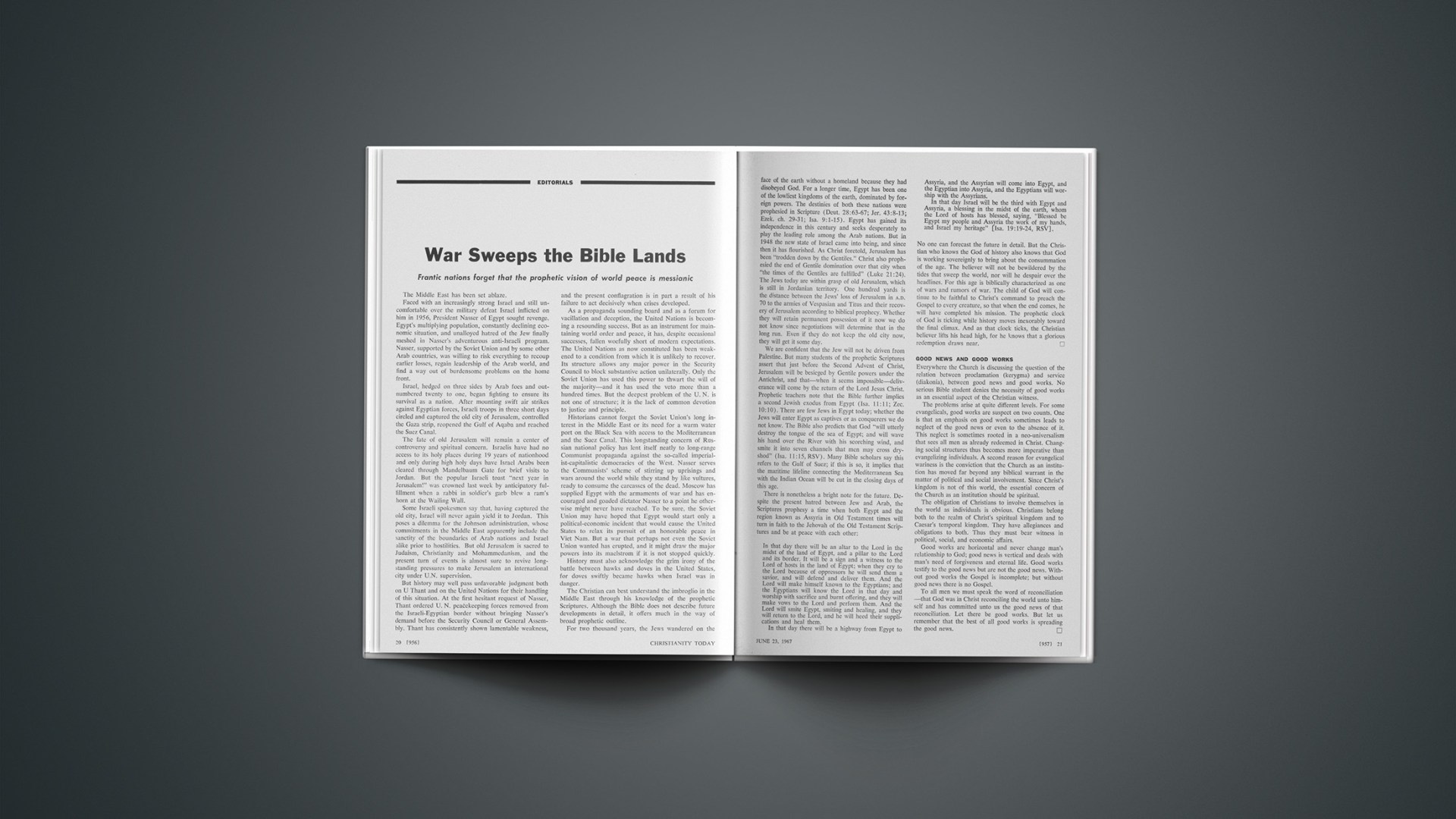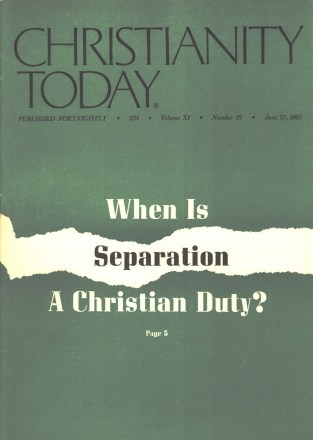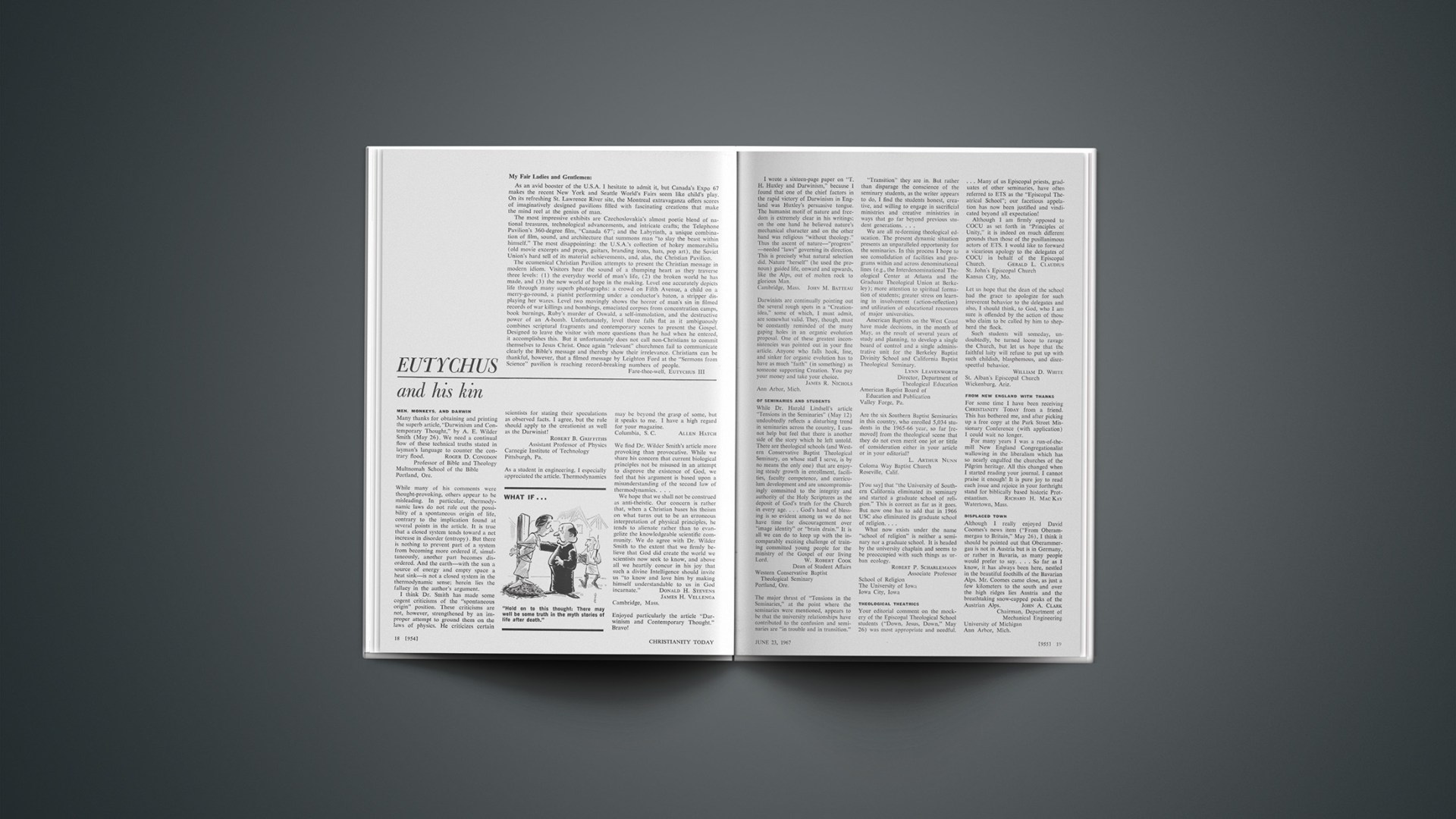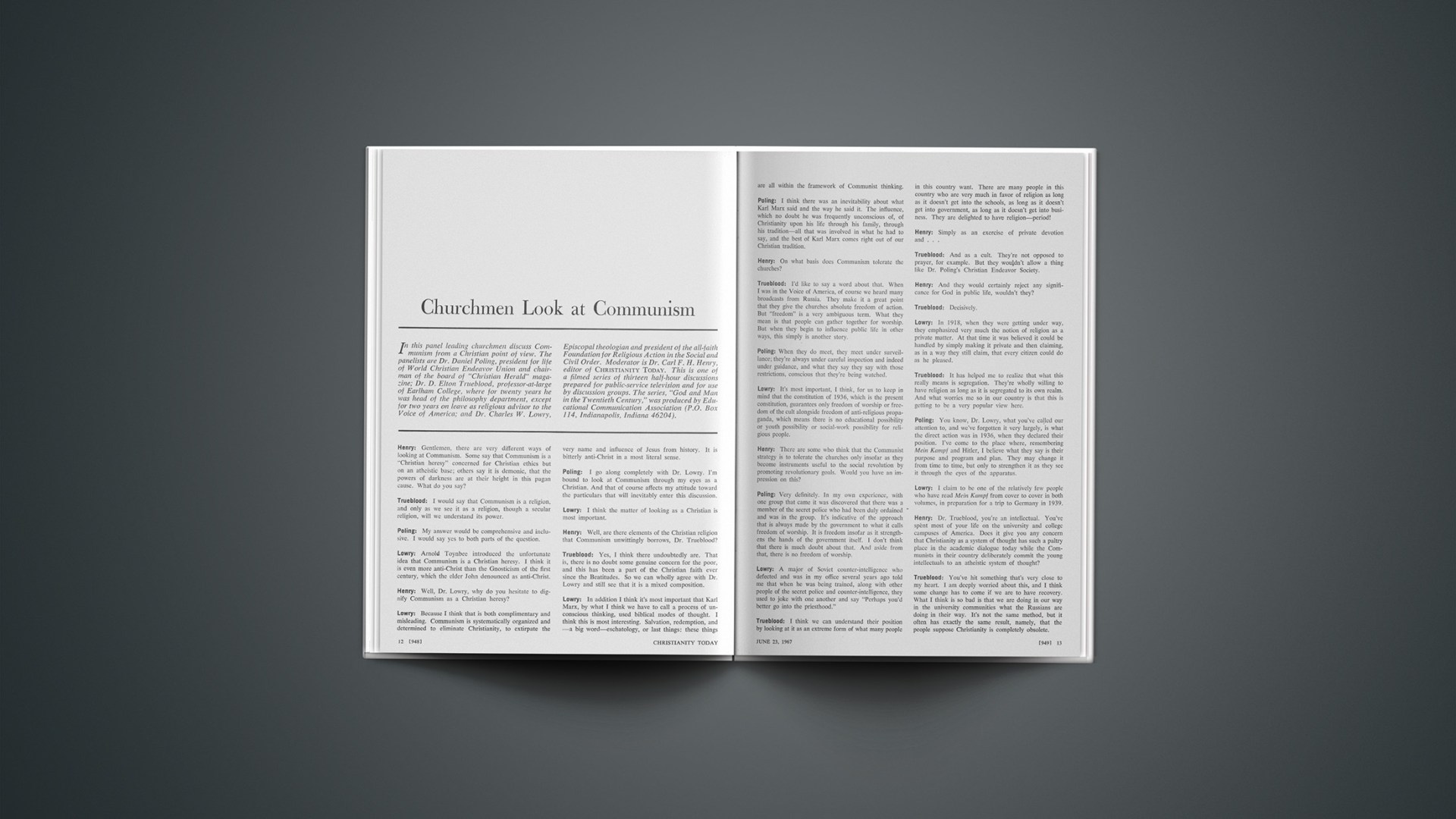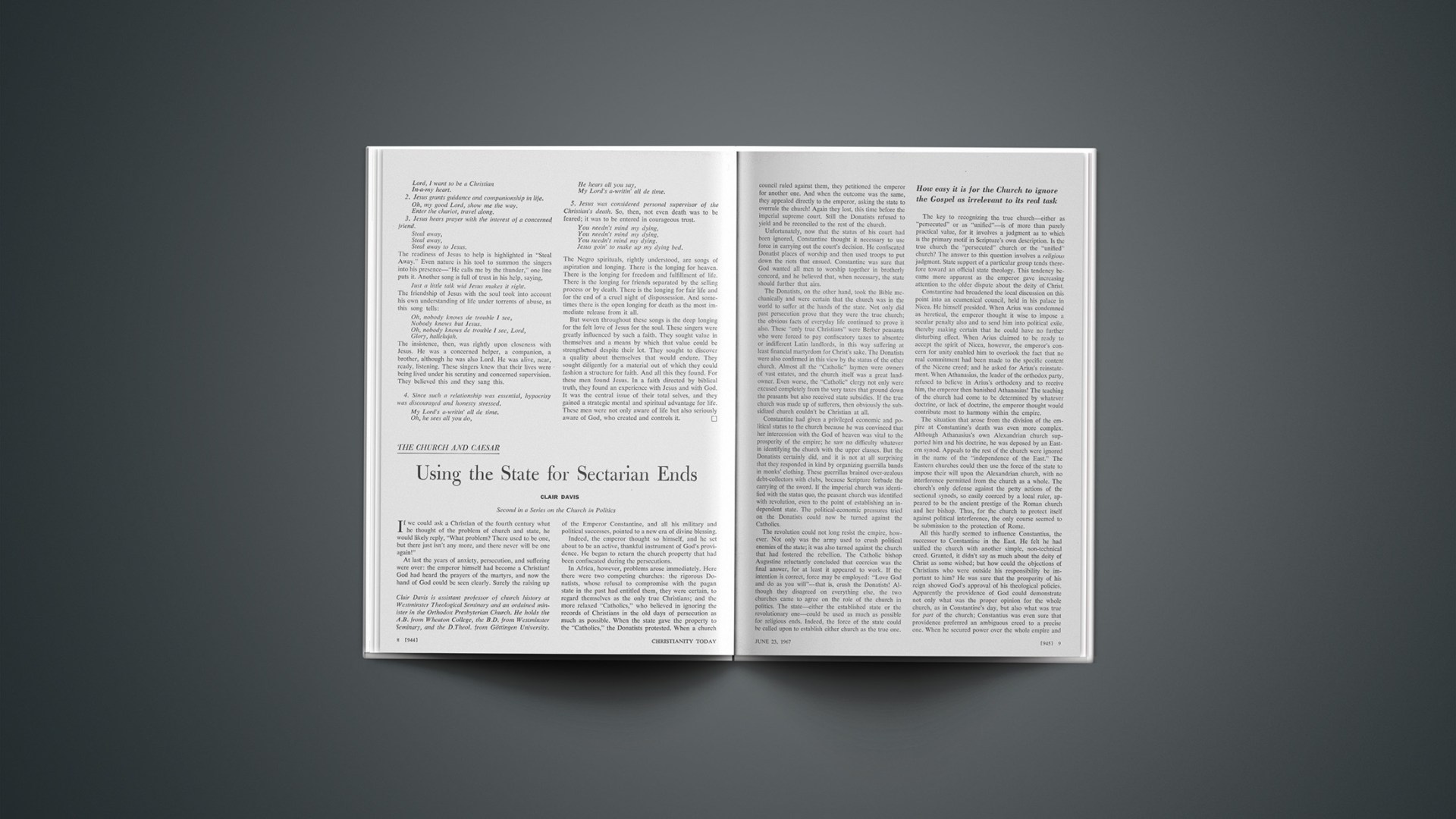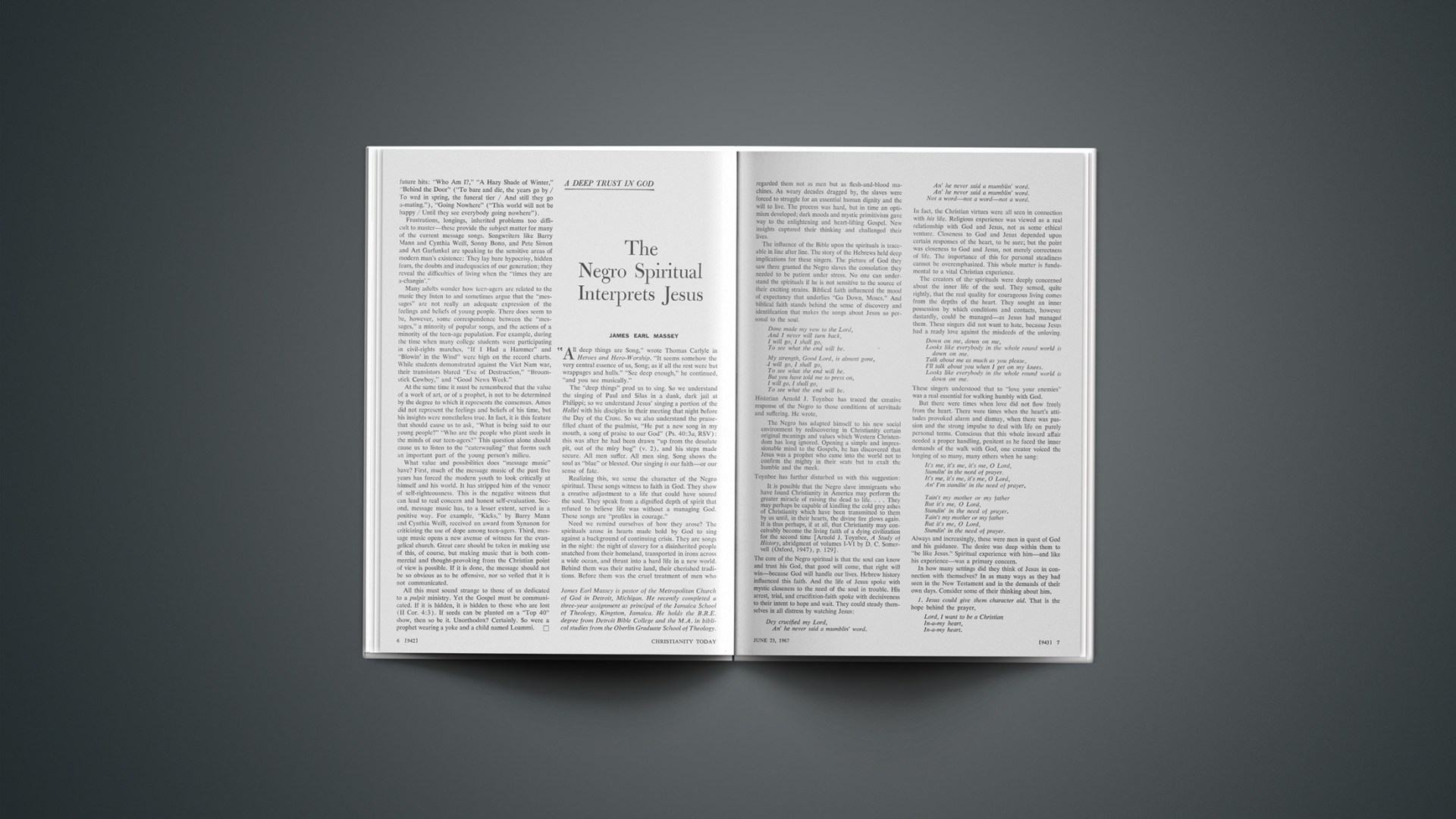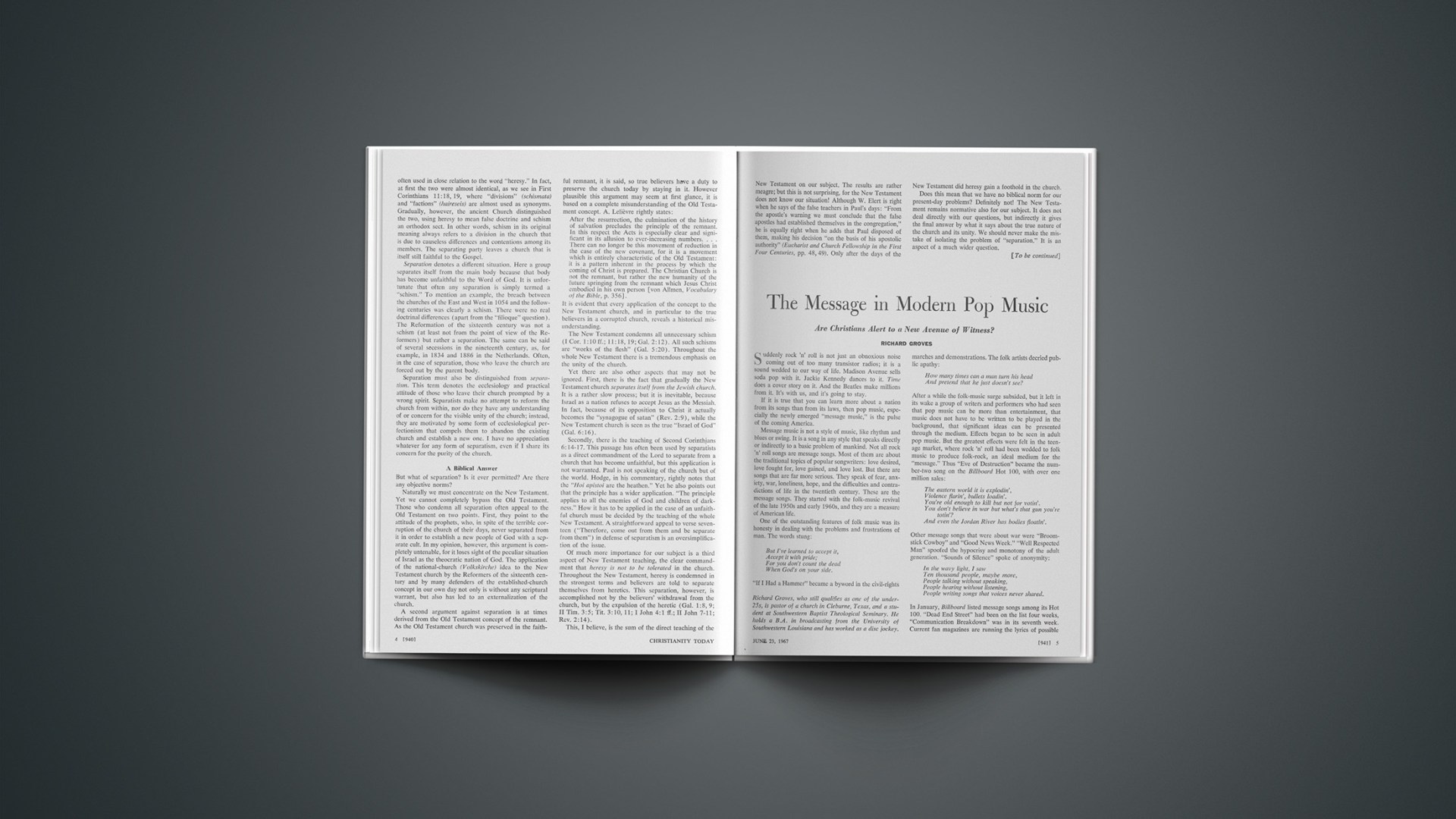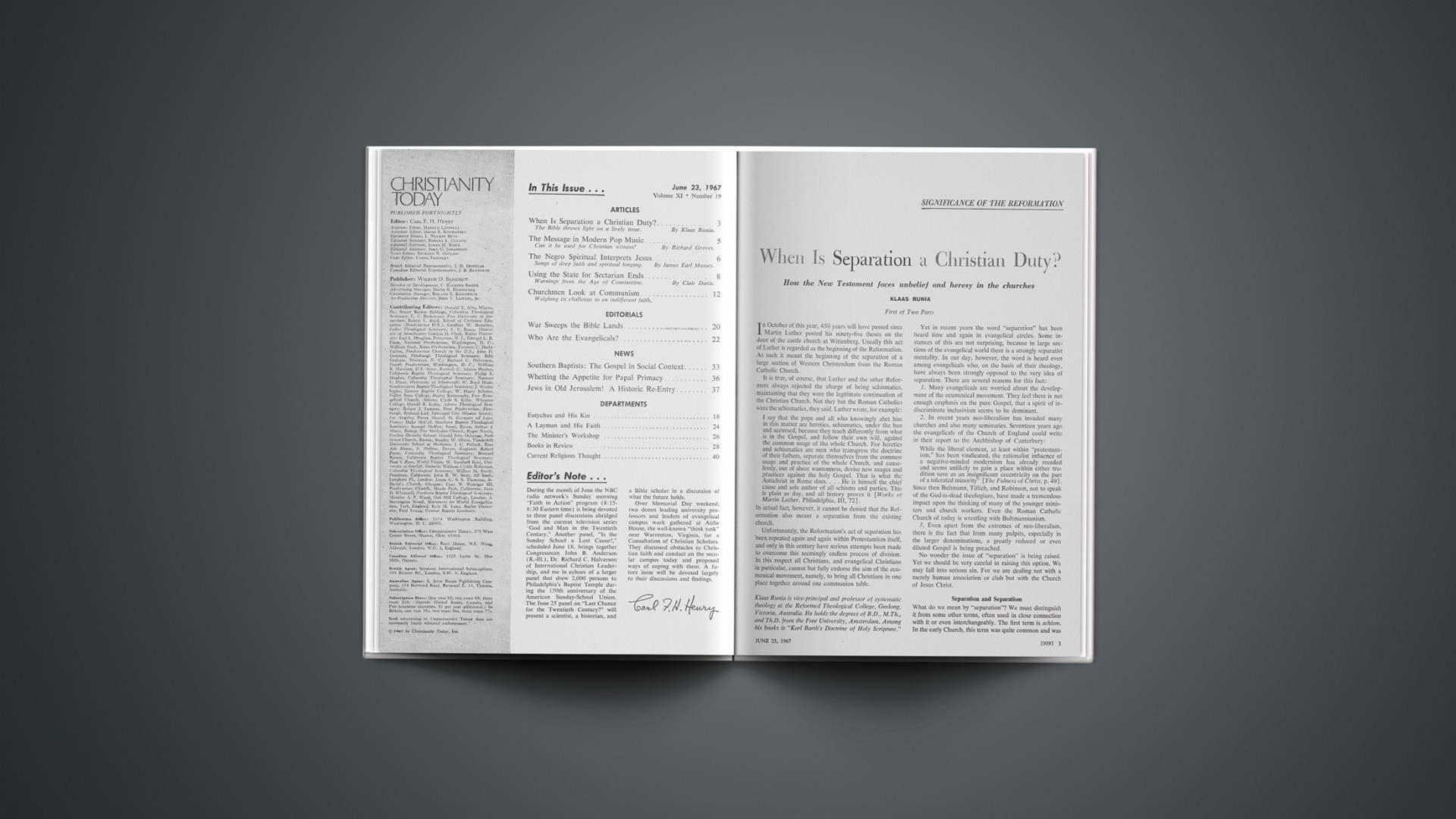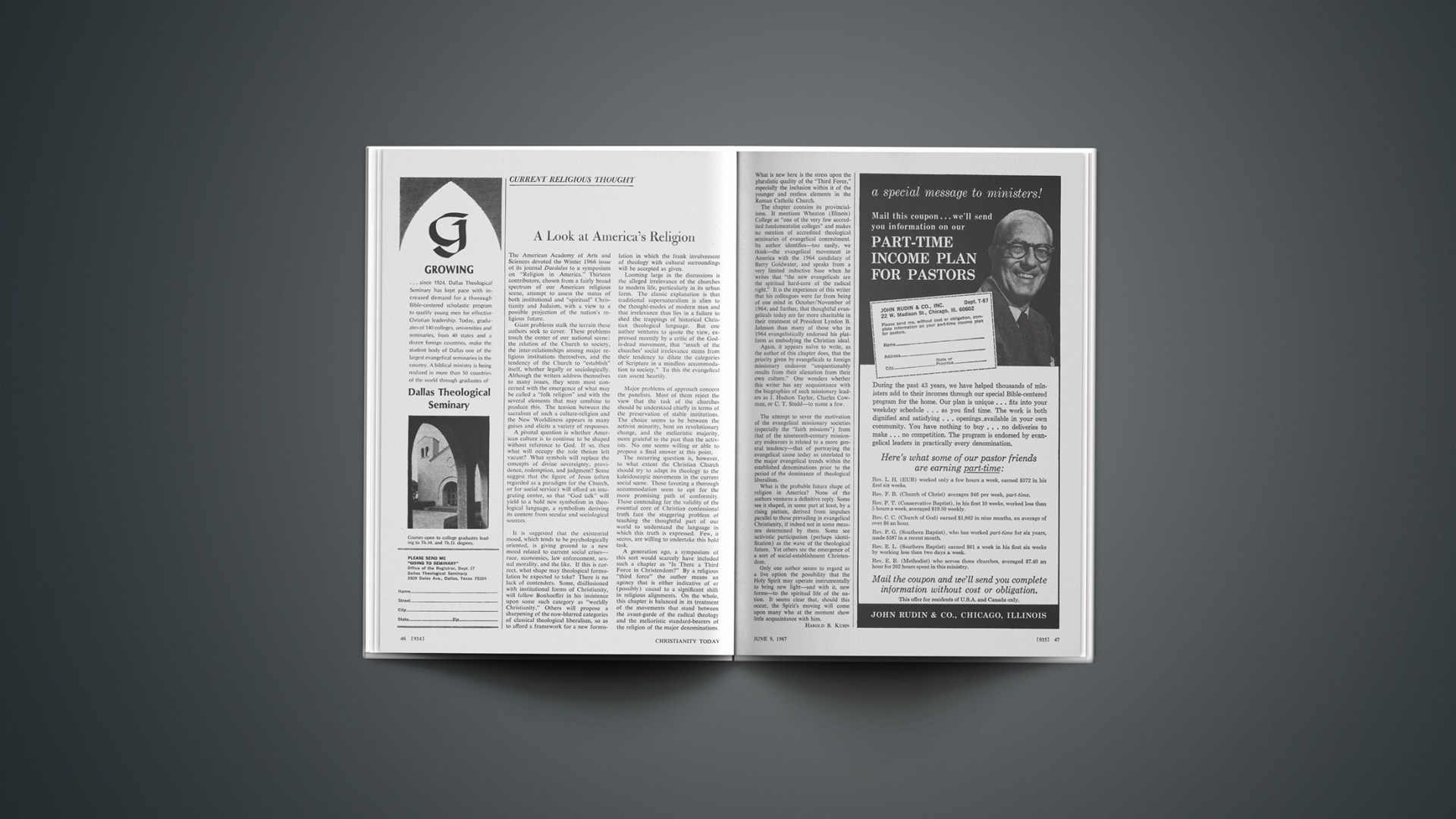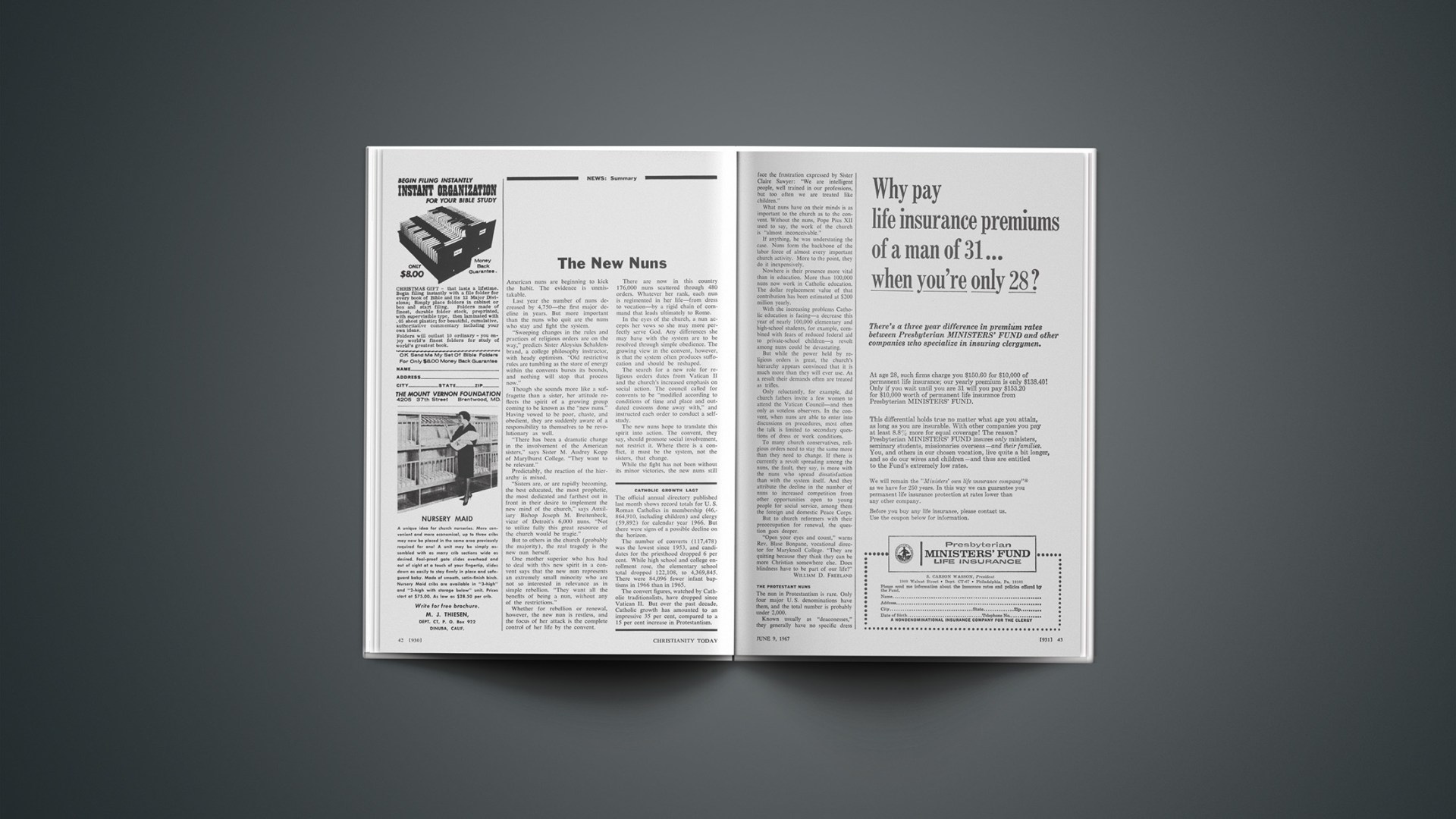Frantic nations forget that the prophetic vision of world peace is messianic
The Middle East has been set ablaze.
Faced with an increasingly strong Israel and still uncomfortable over the military defeat Israel inflicted on him in 1956, President Nasser of Egypt sought revenge. Egypt’s multiplying population, constantly declining economic situation, and unalloyed hatred of the Jew finally meshed in Nasser’s adventurous anti-Israeli program. Nasser, supported by the Soviet Union and by some other Arab countries, was willing to risk everything to recoup earlier losses, regain leadership of the Arab world, and find a way out of burdensome problems on the home front.
Israel, hedged on three sides by Arab foes and outnumbered twenty to one, began fighting to ensure its survival as a nation. After mounting swift air strikes against Egyptian forces, Israeli troops in three short days circled and captured the old city of Jerusalem, controlled the Gaza strip, reopened the Gulf of Aqaba and reached the Suez Canal.
The fate of old Jerusalem will remain a center of controversy and spiritual concern. Israelis have had no access to its holy places during 19 years of nationhood and only during high holy days have Israel Arabs been cleared through Mandelbaum Gate for brief visits to Jordan. But the popular Israeli toast “next year in Jerusalem!” was crowned last week by anticipatory fulfillment when a rabbi in soldier’s garb blew a ram’s horn at the Wailing Wall.
Some Israeli spokesmen say that, having captured the old city, Israel will never again yield it to Jordan. This poses a dilemma for the Johnson administration, whose commitments in the Middle East apparently include the sanctity of the boundaries of Arab nations and Israel alike prior to hostilities. But old Jerusalem is sacred to Judaism, Christianity and Mohammedanism, and the present turn of events is almost sure to revive longstanding pressures to make Jerusalem an international city under U.N. supervision.
But history may well pass unfavorable judgment both on U Thant and on the United Nations for their handling of this situation. At the first hesitant request of Nasser, Thant ordered U. N. peacekeeping forces removed from the Israeli-Egyptian border without bringing Nasser’s demand before the Security Council or General Assembly. Thant has consistently shown lamentable weakness, and the present conflagration is in part a result of his failure to act decisively when crises developed.
As a propaganda sounding board and as a forum for vacillation and deception, the United Nations is becoming a resounding success. But as an instrument for maintaining world order and peace, it has, despite occasional successes, fallen woefully short of modern expectations. The United Nations as now constituted has been weakened to a condition from which it is unlikely to recover. Its structure allows any major power in the Security Council to block substantive action unilaterally. Only the Soviet Union has used this power to thwart the will of the majority—and it has used the veto more than a hundred times. But the deepest problem of the U. N. is not one of structure; it is the lack of common devotion to justice and principle.
Historians cannot forget the Soviet Union’s long interest in the Middle East or its need for a warm water port on the Black Sea with access to the Mediterranean and the Suez Canal. This longstanding concern of Russian national policy has lent itself neatly to long-range Communist propaganda against the so-called imperialist-capitalistic democracies of the West. Nasser serves the Communists’ scheme of stirring up uprisings and wars around the world while they stand by like vultures, ready to consume the carcasses of the dead. Moscow has supplied Egypt with the armaments of war and has encouraged and goaded dictator Nasser to a point he otherwise might never have reached. To be sure, the Soviet Union may have hoped that Egypt would start only a political-economic incident that would cause the United States to relax its pursuit of an honorable peace in Viet Nam. But a war that perhaps not even the Soviet Union wanted has erupted, and it might draw the major powers into its maelstrom if it is not stopped quickly.
History must also acknowledge the grim irony of the battle between hawks and doves in the United States, for doves swiftly became hawks when Israel was in danger.
The Christian can best understand the imbroglio in the Middle East through his knowledge of the prophetic Scriptures. Although the Bible does not describe future developments in detail, it offers much in the way of broad prophetic outline.
For two thousand years, the Jews wandered on the face of the earth without a homeland because they had disobeyed God. For a longer time, Egypt has been one of the lowliest kingdoms of the earth, dominated by foreign powers. The destinies of both these nations were prophesied in Scripture (Deut. 28:63–67; Jer. 43:8–13; Ezek. ch. 29–31; Isa. 9:1–15). Egypt has gained its independence in this century and seeks desperately to play the leading role among the Arab nations. But in 1948 the new state of Israel came into being, and since then it has flourished. As Christ foretold, Jerusalem has been “trodden down by the Gentiles.” Christ also prophesied the end of Gentile domination over that city when “the times of the Gentiles are fulfilled” (Luke 21:24). The Jews today are within grasp of old Jerusalem, which is still in Jordanian territory. One hundred yards is the distance between the Jews’ loss of Jerusalem in A.D. 70 to the armies of Vespasian and Titus and their recovery of Jerusalem according to biblical prophecy. Whether they will retain permanent possession of it now we do not know since negotiations will determine that in the long run. Even if they do not keep the old city now, they will get it some day.
We are confident that the Jew will not be driven from Palestine. But many students of the prophetic Scriptures assert that just before the Second Advent of Christ, Jerusalem will be besieged by Gentile powers under the Antichrist, and that—when it seems impossible—deliverance will come by the return of the Lord Jesus Christ. Prophetic teachers note that the Bible further implies a second Jewish exodus from Egypt (Isa. 11:11; Zec. 10:10). There are few Jews in Egypt today; whether the Jews will enter Egypt as captives or as conquerers we do not know. The Bible also predicts that God “will utterly destroy the tongue of the sea of Egypt; and will wave his hand over the River with his scorching wind, and smite it into seven channels that men may cross dry-shod” (Isa. 11:15, RSV). Many Bible scholars say this refers to the Gulf of Suez; if this is so, it implies that the maritime lifeline connecting the Mediterranean Sea with the Indian Ocean will be cut in the closing days of this age.
There is nonetheless a bright note for the future. Despite the present hatred between Jew and Arab, the Scriptures prophesy a time when both Egypt and the region known as Assyria in Old Testament times will turn in faith to the Jehovah of the Old Testament Scriptures and be at peace with each other:
In that day there will be an altar to the Lord in the midst of the land of Egypt, and a pillar to the Lord and its border. It will be a sign and a witness to the Lord of hosts in the land of Egypt; when they cry to the Lord because of oppressors he will send them a savior, and will defend and deliver them. And the Lord will make himself known to the Egyptians; and the Egyptians will know the Lord in that day and worship with sacrifice and burnt offering, and they will make vows to the Lord and perform them. And the Lord will smite Egypt, smiting and healing, and they will return to the Lord, and he will heed their supplications and heal them.
In that day there will be a highway from Egypt to Assyria, and the Assyrian will come into Egypt, and the Egyptian into Assyria, and the Egyptians will worship with the Assyrians.
In that day Israel will be the third with Egypt and Assyria, a blessing in the midst of the earth, whom the Lord of hosts has blessed, saying, “Blessed be Egypt my people and Assyria the work of my hands, and Israel my heritage” [Isa. 19:19–24, RSV].
No one can forecast the future in detail. But the Christian who knows the God of history also knows that God is working sovereignly to bring about the consummation of the age. The believer will not be bewildered by the tides that sweep the world, nor will he despair over the headlines. For this age is biblically characterized as one of wars and rumors of war. The child of God will continue to be faithful to Christ’s command to preach the Gospel to every creature, so that when the end comes, he will have completed his mission. The prophetic clock of God is ticking while history moves inexorably toward the final climax. And as that clock ticks, the Christian believer lifts his head high, for he knows that a glorious redemption draws near.
Good News And Good Works
Everywhere the Church is discussing the question of the relation between proclamation (kerygma) and service (diakonia), between good news and good works. No serious Bible student denies the necessity of good works as an essential aspect of the Christian witness.
The problems arise at quite different levels. For some evangelicals, good works are suspect on two counts. One is that an emphasis on good works sometimes leads to neglect of the good news or even to the absence of it. This neglect is sometimes rooted in a neo-universalism that sees all men as already redeemed in Christ. Changing social structures thus becomes more imperative than evangelizing individuals. A second reason for evangelical wariness is the conviction that the Church as an institution has moved far beyond any biblical warrant in the matter of political and social involvement. Since Christ’s kingdom is not of this world, the essential concern of the Church as an institution should be spiritual.
The obligation of Christians to involve themselves in the world as individuals is obvious. Christians belong both to the realm of Christ’s spiritual kingdom and to Caesar’s temporal kingdom. They have allegiances and obligations to both. Thus they must bear witness in political, social, and economic affairs.
Good works are horizontal and never change man’s relationship to God; good news is vertical and deals with man’s need of forgiveness and eternal life. Good works testify to the good news but are not the good news. Without good works the Gospel is incomplete; but without good news there is no Gospel.
To all men we must speak the word of reconciliation—that God was in Christ reconciling the world unto himself and has committed unto us the good news of that reconciliation. Let there be good works. But let us remember that the best of all good works is spreading the good news.
For the right—not “on the right”—is the best description of those who proclaim Christ’s Gospel
To many churchgoers today, the evangelicals are a bit of an enigma. Although quite aware of contemporary theology and of current Old and New Testament scholarship, evangelicals tenaciously hold to positions that their critics regard as passé. How can one explain their strange intransigence? What is more, how can one explain the successes of their evangelistic crusades and the power of their supposedly “antiquated” Gospel?
Answers to these questions have spanned a wide spectrum. In the article on “Fundamentalism” in the 1950 and 1957 editions of Chamber’s Encyclopedia, Alan Richardson points to the conservatives’ strong, not to say excessive, allegiance to Scripture. Other descriptions cast evangelicals in the role of malcontents, defenders of a non-institutional church, or belligerent reactionaries. Few critics seem ready to listen to the evangelicals’ description of themselves.
One recent explanation of conservative Christianity appears in an article entitled “Is There a Third Force in Christendom?” in last winter’s issue of Daedelus, the Journal of the American Academy of Arts and Sciences. Its author, history professor William G. McLoughlin of Brown University, views the evangelicals through sociological spectacles, linking them to political conservatism, and asks whether there is cause for regarding them as a third force on the current religious scene. He says:
The new evangelicals are lock, stock, and barrel with Senator Barry Goldwater. For them, applied Christianity is still basically evangelistic soul-winning; they equate Christianity with “the American way of life” as defined by the National Association of Manufacturers; they are hysterically anti-Communist in foreign policy and totally opposed to any extension of the Welfare State in domestic policy. And while they profess sympathy with the civil rights movement and oppose the die-hard segregationists, they still believe that the principle function of the Christian churches in social reform is “proclamation of the gospel” and not social action to “legislate” reform.
This somewhat sweeping analysis leads the Brown University professor to the view that “the new evangelicals are the spiritual hard-core of the radical right.” And he concludes:
If by a third force one means a force that is capable of significantly altering a culture or that is symptomatic of a significant new shift in the dynamics of a culture, then neither those who call themselves “the Conservatives” (or neo-evangelical or fundamentalists) in America, nor the sects, cults, and fringe groups are a third force.
He finds the “third force” in the “pietistic spirit of American culture itself”—an elusive concept, if there ever was one, unless Mr. McLaughlin himself is its gnostic oracle.
Now it must be admitted that there is some truth in this description, at least in its application to American Christianity. Many who are theologically conservative also find themselves holding to conservative political convictions, and the vast majority of evangelicals do favor a politics of principle rather than of pragmatic change. Nevertheless, it is not a political philosophy or an economic commitment that binds the evangelicals together. Evangelicals do not exclude either Democrats or Republicans, nor are they prone to exalt their social and economic views to creedal stature. They come from every denomination, from Pentecostal to Episcopal churches, and are found in many lands. They are also found in every walk of life. They are politicians, laborers, bankers, social workers, performing artists, writers, ministers, and civil servants. What has held them together in the past and what increasingly draws them together today is not their status in society or their political affiliation but their love and concern for the Gospel, the Evangel, and for the Scriptures in which they find it written.
Evangelicals believe the Bible’s description of man’s spiritual condition. They believe that man is lost without Christ, that he is separated from God by sin and threatened by an eternity without him. They believe that a man’s personal problems and the problems between a man and other men flow from the disruption of man’s primary relationship with God. The same cause leads to tension between nations. They believe that God has acted to redeem man to himself in Jesus Christ. They recognize that Christ’s atoning death and triumphant resurrection from the dead are the greatest facts of history and that the proclamation of these events to all men is the primary task of Christians. They confess that faith in Christ brings peace with God, fellowship with the Father and with one another in the Holy Spirit, entrance into a new life of spiritual joy and moral growth through prayer, service, and a study of God’s Word, and the assurance of a blessed life with Christ beyond the grave. Moreover, evangelicals believe that the vast majority of Christians in all ages have also believed these doctrines and have molded their lives around them.
Evangelicals also see the need for an extension of Christ’s lordship over all areas of life and find here their impulse both for evangelism and for social concern. They recognize social concern as a biblical imperative and note that long before the more liberal churches and theologians jumped on their lopsided social-gospel bandwagon, the evangelicals were already active in the war against slavery and against child labor, in the establishment of schools, hospitals, and literacy campaigns in underdeveloped areas of the world, and in work for the deaf and the dumb and for prisoners. They are encouraged by many of their present efforts, particularly on the mission field, in the ghettos of our major cities, and among the nation’s youth. At the same time, they are increasingly aware of many failures in these areas and seek for a greater vision and a greater and more universal impact.
For evangelicals, however, social concern does not mean an endorsement of lawlessness, nor does it mean love apart from holiness or reconciliation apart from justice. It means the self-effacing and sacrificial demonstration of the love of Christ for the needy by Christians. Evangelicals rejoice that this, by God’s grace and accompanied by the preaching of the Gospel, has often brought men into subjection to Christ and to the objective and righteous standards of his Word. To know Jesus Christ in this way is true freedom and the greatest human good.
Does this mean that the evangelicals are a third force in America, to be ranked alongside the Protestant bodies and the Roman Catholic Church? Not at all. To think so is to miss the point. It means, on the contrary, that there is really only one force in Christendom: the power of Christ operating through the Gospel where-ever it is faithfully acknowledged and proclaimed. To recognize this truth and to strive for it is to be an evangelical. To proclaim the Evangel by word and by deed is the great task confronting Christians.
Prayer In The Schools
Senate Joint Resolution Number One in the Ninetieth Congress consists of Minority Leader Everett Dirksen’s new proposal for a school-prayer amendment to the United States Constitution. Although a similar Senate bill proposed by Dirksen in the last Congress gained a 47–39 majority, it failed to win the necessary two-thirds vote. The new resolution at present remains in the special subcommittee on constitutional amendments, chaired by Senator Birch Bayh, an opponent of the prayer amendment last session. Dirksen is determined that it reach the Senate floor as soon as poossible.
This time his amendment reads:
Nothing contained in the Constitution shall abridge the right of persons lawfully assembled, in any public building which is supported in whole or in part through the expenditure of public funds, to participate in non-denominational prayer.
We commend Senator Dirksen for his courageous efforts in support of the freedom to pray in our public schools. But no amendment is needed to enable citizens to pray voluntarily in the schools. In its Engel and Schempp decisions, the United States Supreme Court ruled that state-prescribed devotional exercises were unconstitutional on the basis of the “establishment clause” of the First Amendment; it did not outlaw personal prayer. The court in Schempp assumed a “wholesome neutrality” that on one hand stood against governmental support of the tenets of one or of all orthodoxies and on the other reasserted “the values of religious training, teaching, and observance and, more particularly the right of every person to freely choose his own course with reference thereto, free of any compulsion from the state.”
The individual citizen continues to be as free to pray or read his Bible in the public school as he always has been, but the school cannot now legally conduct such religious exercises. This is as it should be. No informed Christian believes that even gentle coercion by the state is a desirable means of cultivating religious faith. While the public school should incorporate into its curriculum the religious heritage of the nation, it is not and should not be a vehicle for religious indoctrination. For a public school in a pluralistic society to sanction particular religious forms—even on the basis of majority rule in a given community—is to offer official support to a sectarian religious viewpoint. This can lead to violations of religious freedom not only by dominant Protestant sectarians but also by Roman Catholics, Mormons, or possibly Buddhists in certain communities.
For over 175 years the First Amendment has demonstrated its value as a safeguard of religious freedom and a clear statement of the line of separation between church and state. Senator Dirksen’s amendment, which voices a plea for the right of persons to participate in non-denominational prayer in publicly supported buildings, not only is unnecessary but might lead to prescribed sectarianism if the prayer were truly biblical, or to innocuous religiosity if it were not.
The best means for counteracting the growing secularism in modern society is for Christians to witness to the Christ of the Bible in home, church, and the community-at-large. Respecting the freedom of all men, Christians must never impose their understanding of God’s truth on anyone or seek state assistance in propagating Christian doctrine or devotional practices. But neither must they apathetically allow an unofficial humanistic religion to emerge in the public schools. Christians must cooperate with school officials so that freedom of religion may be maintained and a fair and accurate representation of Christian ideas and influences may be objectively studied as a significant aspect of man’s total life. They might also suggest that school administrators provide for a moment of silence for prayer and meditation at the start of each school day.
Instead of passing a constitutional amendment, lawmakers could help dispel the public’s confusion about religion in the public schools by drawing up a resolution that would clearly set forth the intent of Congress on this crucial question.

